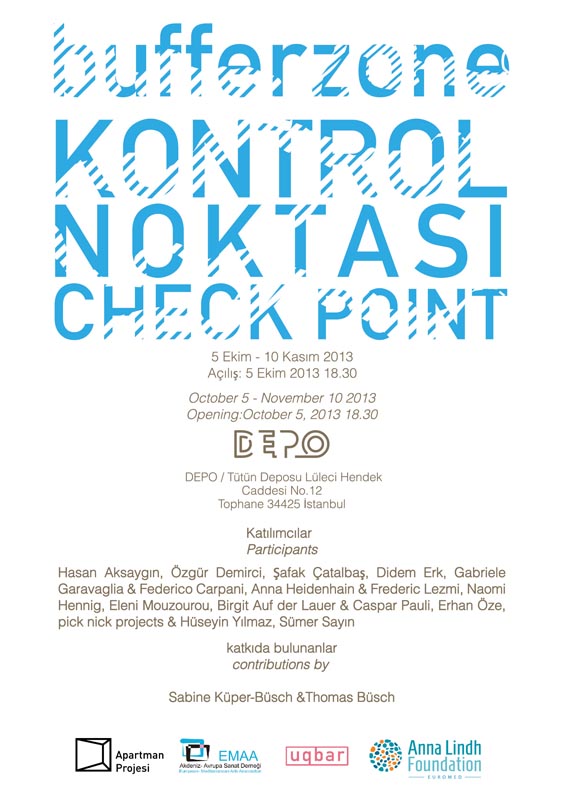Imago Mundi – Luciano Benetton Collection / Istanbul Codex / Emotional Citizen, 2015
30/07/2016

Şafak Çatalbaş
Emotional Citizen, 2015
Six universally recognized facial expressions of emotion performed in the photo booth one after another; the result is transferred onto the canvas.
Şafak Çatalbaş / Emotional Citizen, 2015
http://www.imagomundiart.com/artworks/safak-catalbas-emotional-citizen
Istanbul Codex / Turkey / 227 Artworks
http://www.imagomundiart.com/collections/istanbul-codex
Üç Ayaklı Masa: Bir Organizma / Three Legged Table: An Organism
07/03/2016
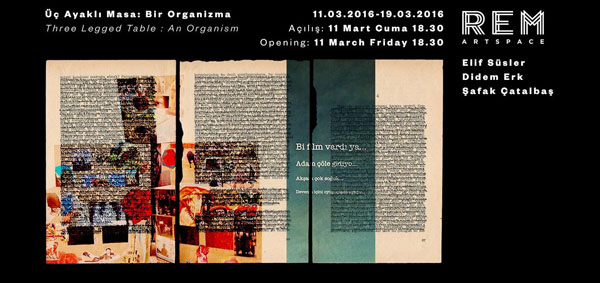
–Please Scroll Down for English–
Sanatçılar: Elif Süsler, Didem Erk, Şafak Çatalbaş
Rem Art Space, 11 Mart – 19 Mart 2016 tarihleri arasında Üç Ayaklı Masa: Bir Organizma performans projesi, sürece odaklanan ve sergi alanının üretim alanı olarak kullanılacağı disiplinlerarası çalışma sürecini kayıt altına alacak bir yapıya ev sahipliği yapıyor.
Birbiriyle ilişkili, aynı zamanda bağımsız üç masa etrafında gelişen olaylar bir bilinmeyene zemin hazırlar: Eylemler belirli, çarpışmalarsa sevimli, ne zaman ne yapacağı belli olmayan bir kedi gibi. Üç Ayaklı Masa, daimi performans fikrine dayanan, süregiden performatif eylemlerin bir kesitini zaman ve mekan içinde görünür kılan, hayatta kalabilmek için sergi kılığına girmiş bir organizmadır. Bu halde yaklaşık bir hafta ila on günlük bir ömrü vardır, daha sonra yeni bir kılığa bürünmek zorundadır. Seyirciyi davet eder fakat katılımcılık gibi bir kaygısı yoktur. Daimi performans fikrine dayandığı gibi eylemsizlik fikrine de açıktır.Dursa da hareket eder, nefes alır, nefes verir.
Bu bağlamda, Didem Erk’in bilinç akışı tekniğini kullanarak oluşturduğu monologların hafıza ile ilişkisi, seçilmiş bir kitap üzerinden kurgusallıktan uzak performatif bir eylem ile evcilleştirilmemiş hafızanın görünümünü yansıtırken, Elif Süsler’in kimliksiz binalarla çevrili yaşam alanlarımızı kartpostallar ile bir maskeye dönüştürerek “geçmiş” ile iletişim kurmamızı sağlayan iyileştirici ama aynı zamanda da ironik bir bakış açısı üzerinden yapacağı önermesi, Şafak Çatalbaş’ın sokaktan diyalogları rüya kayıtlaryla ördüğü her gün değişen senaryosu ve mekanda gerçek zamanlı kayıtlarla süregiden oyuncu seçmeleriyle hayat bulan şipşak film üretim projesi ile tamamlanarak, zamanın bellek ile ilişkisi üzerinden bir kayıt niteliği taşıyacaktır.
Pazartesi hariç her gün 12.00-17.00 arası REM’e gelip performanslara katılımcı veya izleyici olarak dahil olabilirsiniz.
REM Art Space
Üç Ayaklı Masa: Bir Organizma : 11.03.2016 – 19.03.2016
Açılış: 11 Mart, 18.30 Cuma
A: Çukurcuma Caddesi No: 20 Beyoğlu – İstanbul
T: 0212 245 25 40
W: www.remartspace.org
S: Salı – Cumartesi / 11:00 – 19:00
Pazar: 12:00 / 18:00
————————————————————————————-
Artists: Elif Süsler, Didem Erk, Şafak Çatalbaş
Rem Art Space, with the performance project Three Legged Table: An Organism, hosts a structure that focuses on the process, and records the interdisciplinary study process of the exhibition space used as the production area, between the dates of March 11th – March 19, 2016.
The events that take place around three interrelated but also independent tables prepare the ground for a mystery: The events are precise, the collisions are cute, just like an unpredictable cat. Three Legged Table is an organism which is based on the idea of the permanent performance, makes a part of the ongoing performative actions visible in the setting and that masquerades as an exhibition. In this way, it lasts about a week or ten days, afterwards, it has to take a new form. The audience is invited however there are no pressure on participation.
In this sense, Didem Erk’s connections between the monologues and the memory which she has created by using the stream of consciousness method that reflects the nondomesticated image of the memory through a performative and nonfictional action from a chosen book; while Elif Süsler’s resolution which provides communication with “the past” by transforming our living space surrounded by building into a mask with postcards, through a healing but also ironic point of view and also Şafak Çatalbaş’s everyday changing scenario that she created through dream records by the street dialogues and the instant movie production project created through real-time ongoing auditions in the area come together. Therefore, these will stand for a record that represents the connection between the time and the memory.
REM Art Space
Three Legged Table: An Organism : 11.03.2016 – 19.03.2016
Opening ; 11 March, 18.30
A: Çukurcuma Caddesi No: 20 Beyoğlu – İstanbul
T: 0212 245 25 40
W: www.remartspace.org
H: Tuesday – Saturday / 11:00 – 19:00
Sunday: 12:00 / 18:00
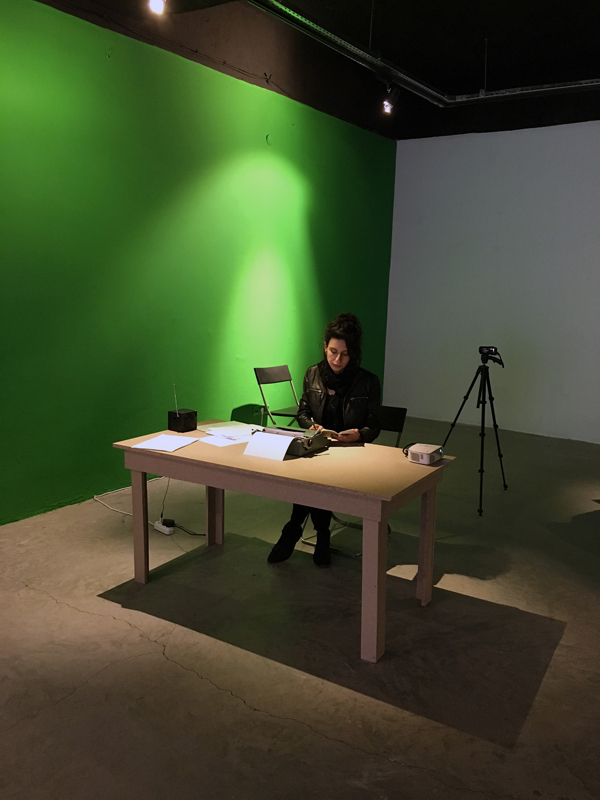
Kino-Palavra; performative installation, 2016
View from the performative exhibition “Three Legged Table: An Organism”, REM Art Space, Istanbul, 2016
Open Studio at Cité Internationale des Arts, Paris
25/09/2015
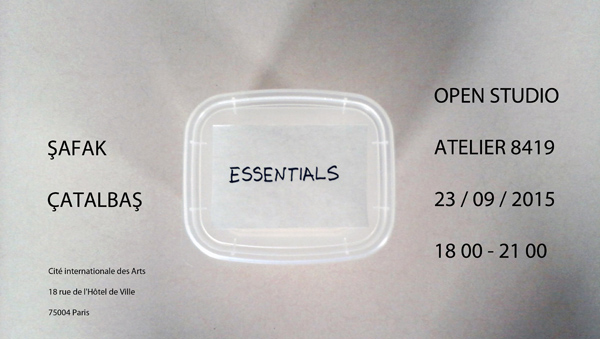
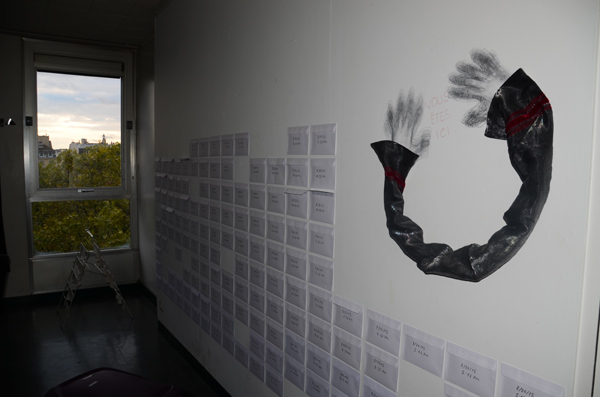
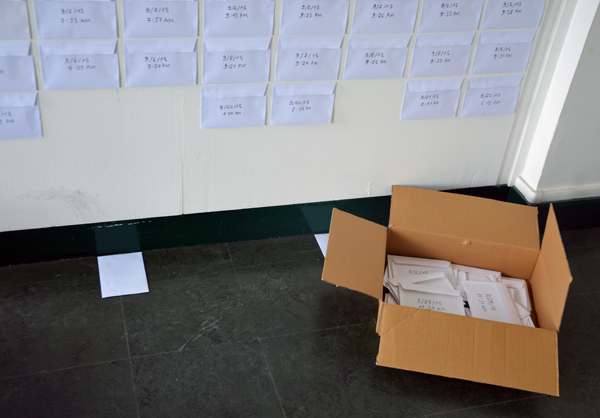
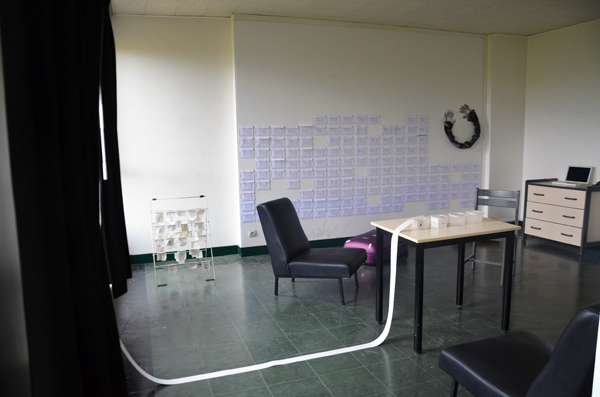
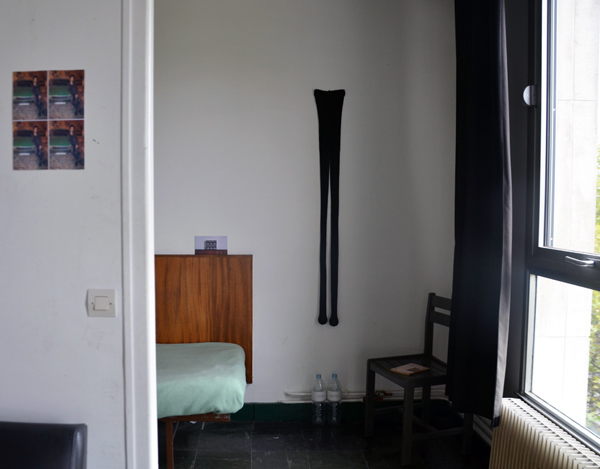
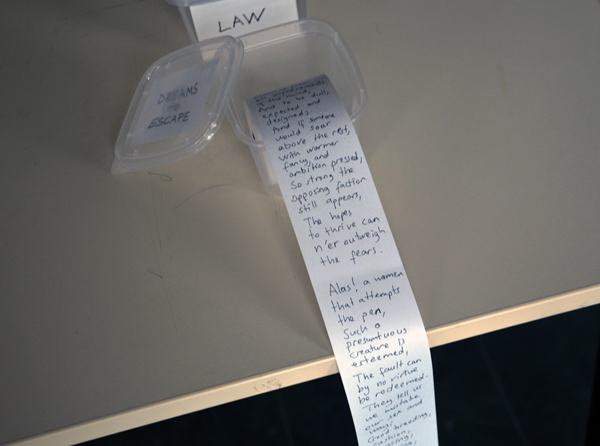
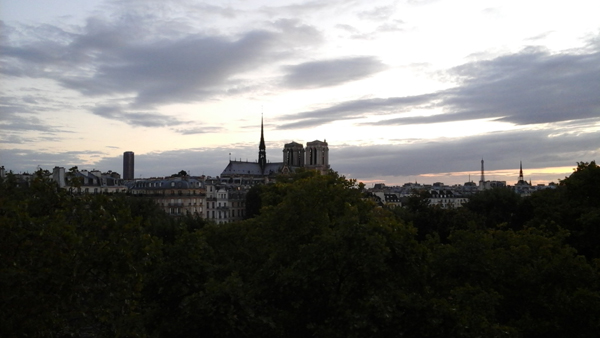
Inspired by my three-month residency at Cité Internationale des Arts in the summer of 2015. Paris view, lemon juice, hidden tracks, plastic fingers, iron dreams, a mon sevl desir, atelier 8419 – a room of one’s own.
stay with me
24/11/2014
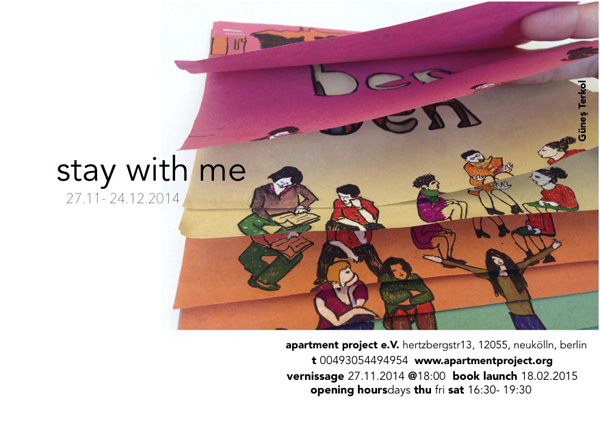
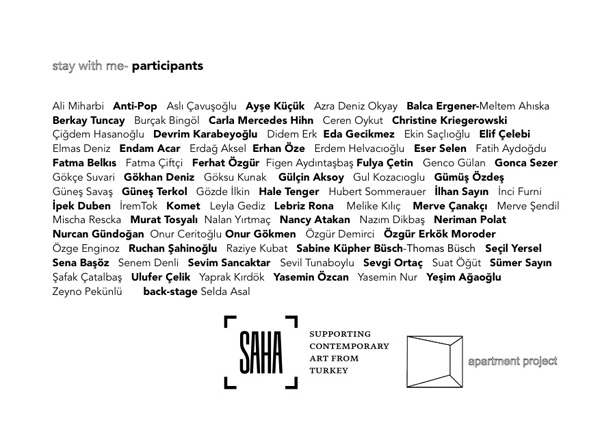
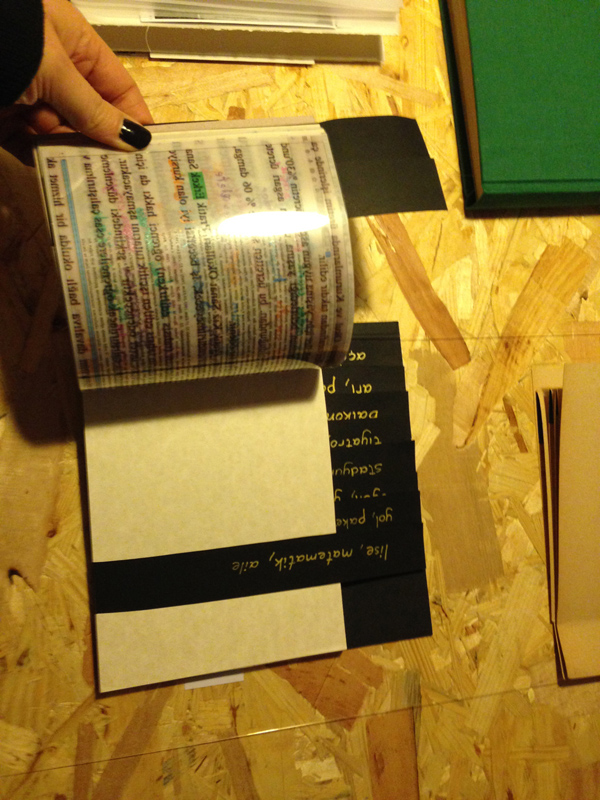
Official Dream Diary, 2014 // View from the exhibition “stay with me”, Apartment Project Berlin, Germany
Dönüştürmeler / Conversions
09/11/2014
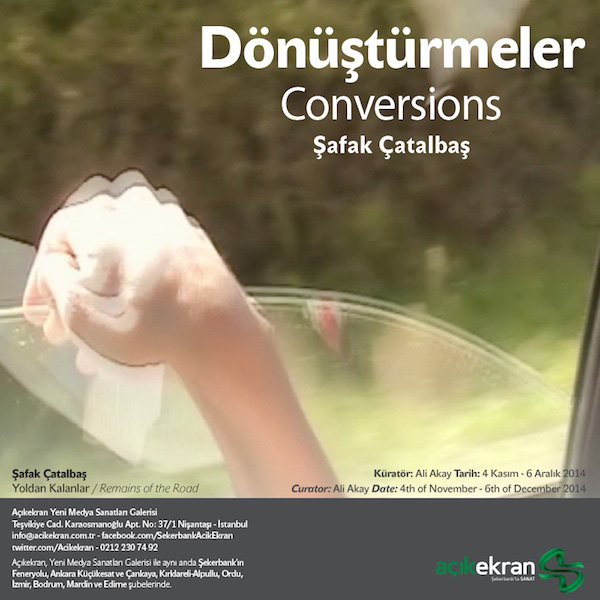
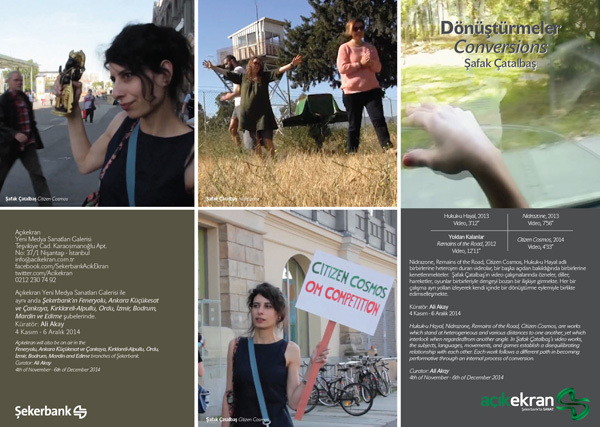
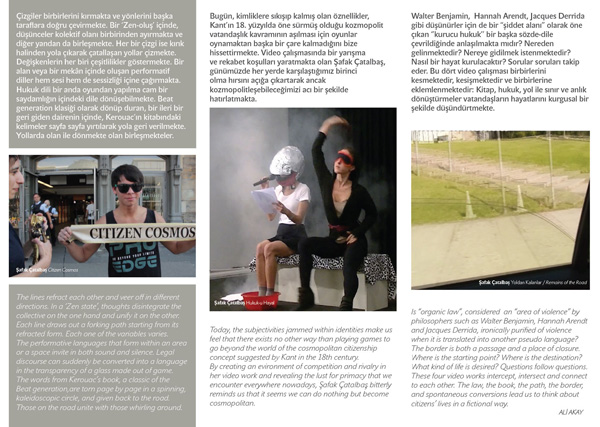
Nidrazone, Remains of the Road, Citizen Cosmos, Hukuk-u Hayal adlı birbirlerine heterojen duran videolar, bir başka açıdan bakıldığında birbirlerine kenetlenmekteler. Şafak Çatalbaş’ın video çalışmalarında özneler, diller, hareketler, oyunlar birbirleriyle dengeyi bozan bir ilişkiye girmekte. Her bir çalışma ayrı yolları izleyerek, kendi içinde bir dönüştürme eylemiyle birlikte edimselleşmekte.
Çizgiler birbirlerini kırmakta ve yönlerini başka taraflara doğru çevirmekte. Bir ‘Zen-oluş’ içinde, düşünceler kolektif olanı birbirinden ayırmakta ve diğer yandan da birleşmekte. Her bir çizgi ise kırık halinden yola çıkarak çatallaşan yollar çizmekte. Değişkenlerin her biri çeşitlilikler göstermekte. Bir alan veya bir mekan içinde oluşan performatif diller hem sesi hem de sessizliği içine çağırmakta. Hukuk dili bir anda oyundan yapılma cam bir saydamlığın içindeki dile dönüşebilmekte. Beat generation klasiği olarak dönüp duran, bir ileri bir geri giden dairenin içinde, Kerouac’ın kitabındaki kelimeler sayfa sayfa yırtılarak yola geri verilmekte. Yollarda olan ile dönmekte olan birleşmekteler.
Bugün, kimliklere sıkışıp kalmış olan öznellikler, Kant’ın 18.yüzyılda öne sürmüş olduğu kozmopolit vatandaşlık kavramının dünyasının aşılması için oyunlar oynamaktan başka bir çare kalmadığını bize hissettirmekte. Video çalışmasında bir yarışma ve rekabet koşulları yaratmakta olan Şafak Çatalbaş, günümüzde her yerde karşılaştığımız birinci olma hırsını açığa çıkartarak ancak kozmopolitleşebileceğimizi acı bir şekilde hatırlatmakta.
Walter Benjamin, Hannah Arendt Jacques Derrida gibi düşünürler için de bir ‘şiddet alanı’ olarak öne çıkan ‘’kurucu hukuk’’ bir başka sözde-dile çevrildiğinde anlaşılmakta mıdır? Nereden gelinmektedir? Nereye gidilmek istenmektedir? Nasıl bir hayat kurulacaktır? Sorular soruları takip eder. Bu dört video çalışması birbirlerini kesmektedir, kesişmektedir ve birbirlerine eklemlenmektedir: Kitap, hukuk, yol ile sınır ve anlık dönüştürmeler vatandaşların hayatlarını kurgusal bir şekilde düşündürtmekte.
Ali Akay
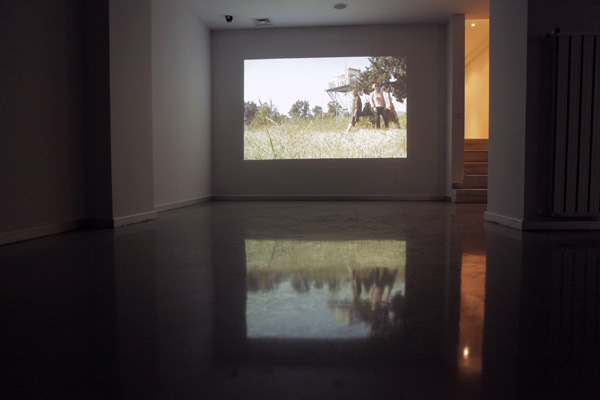
View from the exhibition “Conversions”, Açıkekran New Media Arts Gallery, Istanbul, 2014
Über Nacht… im Künstlercamp / jetzt.de / Süddeutsche Zeitung
23/07/2014
jetzt.de
Süddeutsche Zeitung
21.07.2014 – 16:30 Uhr
Über Nacht… im Künstlercamp
Text: steffi-fetz – und Lisa Altmeier
Lisa und Steffi sind drei Monate lang als Crowdspondent-Reporter in Deutschland unterwegs. Sie recherchieren, was die Leser wollen. Für jetzt.de schlafen sie ab jetzt jede Woche an einem ungewöhnlichen Ort denn die Nacht hat ihre eigenen Geschichten.
Vorsichtig tapsen wir um kurz nach 22 Uhr über die Schwelle von Tor Nummer 5. Es ist eine der wenigen Industriehallen, in denen jetzt noch Licht brennt. Ein Beamer wirft Wörter an die Wand und auf die gelbe Jacke einer Frau. Mit einem Bleistift malt sie die Umrisse von Buchstaben in die poröse Mauer. Später wird sie uns erzählen, dass sie Safak heißt. Safak ist Künstlerin und wohnt hier. „Wollt ihr mitmachen?“ fragt sie und drückt uns zwei Stifte in die Hand.
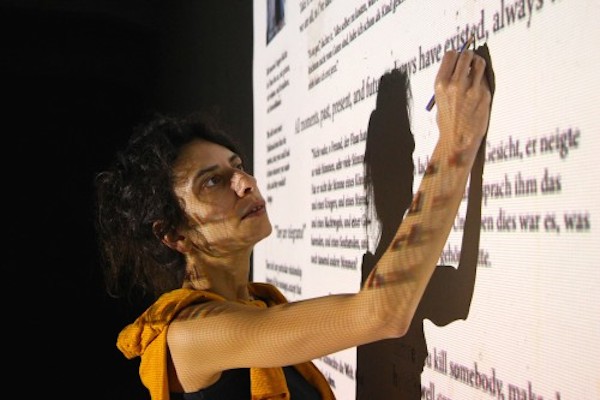
Nachts hat man die Muße und Ruhe, Romane an die Wand zu malen.
(…)
For full text click here
Siddhartha Meets Billy and the Bugs And The Other Guys
22/07/2014
All this happened, more or less.
Birds were talking.
One bird said to Billy Pilgrim, “Poo-tee-weet?”
War es nicht dies, was heute endlich seinen Tod gefunden hatte, hier im Walde an diesem lieblichen Flusse? War es nicht dieses Todes wegen, dass er jetzt wie ein Kind war, so voll Vertrauen, so ohne Furcht, so voll Freude?
When a Tralfamadorian sees a corpse, all he thinks is that the dead person is in bad condition in that particular moment, but that the same person is just fine in plenty of other moments.
All time is all time. It does not change. It does not lend itself to warnings or explanations. It simply is. Take it moment by moment, and you will find that we are all, as I’ve said before, bugs in amber.
“Es ist gut”, dachte er, “alles selber zu kosten, was man zu wissen nötig hat. Dass Weltlust und Reichtum nicht vom Guten sind, habe ich schon als Kind gelernt. Gewusst habe ich es lange, erlebt habe ich erst jetzt.”
And Billy zoomed back in time to his infancy. He was a baby who had just been bathed by his mother.
Ihm schien, es habe der Fluss ihm etwas Besonderes zu sagen, etwas, das er noch nicht wisse, das noch auf ihn warte.
All moments, past, present, and future, always have existed, always will exist.
Mit tausend Augen blickte der Fluss ihn an, mit grünen, mit weissen, mit kristallnen, mit himmelblauen.
And the blue line met the red line and then the yellow line, and then the yellow line stopped because the character represented by the yellow line was dead. And so on.
The stills were more Tralfamadorian than the movies, since you could look at them whenever you wanted to, and they wouldn’t change.
“Nicht wahr, o Freund, der Fluss hat so viele Stimmen, sehr viele Stimmen? Hat er nicht die Stimme eines Königs, und eines Kriegers, und eines Stieres, und eines Nachtvogels, und einer Gebärenden, und eines Seufzenden, und noch tausend andere Stimmen?
Somewhere a dog barked. With the help of fear and echoes and winter silences, that dog had a voice like a big bronze gong.
Glücklich lachte Vasudevas Gesicht, er neigte sich gegen Siddhartha und sprach ihm das heilige Om ins Ohr. Und eben dies war es, was auch Siddhartha gehört hatte.
“They are telegrams?”
“Es ist so”, nickte Vasudeva, “alle Stimmen der Geschöpfe sind in seiner Stimme.”
“Und weisst du”, fuhr Siddhartha fort, “welches Wort er spricht, wenn es dir gelingt, alle seine zehntausend Stimmen zugleich zu hören?”
There are no telegrams on Tralfamadore. But you’re right: each clump of symbols is a brief, urgent message – describing a situation, a scene. We Tralfamadorians read them all at once, not one after the other. There isn’t any particular relationship between all the messages, except that the author has chosen them carefully, so that, when seen all at once, they produce an image of life that is beautiful and surprising and deep. There is no beginning, no middle, no end, no suspense, no moral, no causes, no effects.
“Von jeder Wahrheit ist das Gegenteil ebenso wahr!”
Before you kill somebody, make absolutely sure he isn’t well connected. So it goes.
Bitter schmeckte die Welt. Qual war das Leben.
“You never said a truer word, dear.”
Vielleicht ist es dies, was dich hindert, den Frieden zu finden, vielleicht sind es die vielen Worte. Denn auch Erlösung und Tugend, auch Sansara und Nirwana sind blosse Worte, Govinda. Es gibt kein Ding, das Nirwana wäre; es gibt nur das Wort Nirwana.”
“Only on Earth is there any talk of free will.”
“Yes.”
In der Geduld waren sie beide Meister.
“How did I get so old?”
Sechzig Jahre ist er alt geworden und hat Nirwana nicht erreicht.
“That’s one thing Earthlings might learn to do, if they tried hard enough: Ignore the awful times, and concentrate on the good ones.”
Nun aber weilte sein befreites Auge diesseits, es sah und erkannte die Sichtbarkeit, suchte Heimat in dieser Welt, suchte nicht das Wesen, zielte in kein Jenseits.
Billy was unconscious for two days after that, and he dreamed millions of things, some of them true. The true things were time-travel.
Er tötete seine Sinne, er tötete seine Erinnerung, er schlüpfte aus seinem Ich in tausend fremde Gestaltungen, war Tier, war Aas, war Stein, war Holz, war Wasser, und fand sich jedesmal erwachend wieder, Sonne schien oder Mond, war wieder Ich, schwang im Kreislauf, fühlte Durst, überwand den Durst, fühlte neuen Durst.
“Dresden,” said Billy.
“Dresden,” Lily told Rumfoord.
“He’s simply echoing things we say,” said Rumfoord.
“Oh,” said Lily.
“He’s got echolalia now.”
“Oh.”
Schon verstand er, lautlos das Om zu sprechen, das Wort der Worte, es lautlos in sich hineinzusprechen mit dem Einhauch, es lautlos aus sich herauszusprechen mit dem Aushauch, mit gesammelter Seele, die Stirn umgeben vom Glanz des klar denkenden Geistes.
Billy had a fractured skull, but he was still conscious. He didn’t know where he was. His lips were working, and one of the golliwogs put his ear close to them to hear what might be his dying words.
“Heute werden wir die Lehre aus seinem Munde vernehmen”, sagte Govinda.
They were going to travel fast. They were damned if they’d surrender. They shook hands all around. They called themselves “The Three Musketeers.”
Billy thought the golliwog had something to do with World War Two, and he whispered to him his address: “Schlachthof-fünf.”
Mit einem Kuss nahm Siddhartha Abschied.
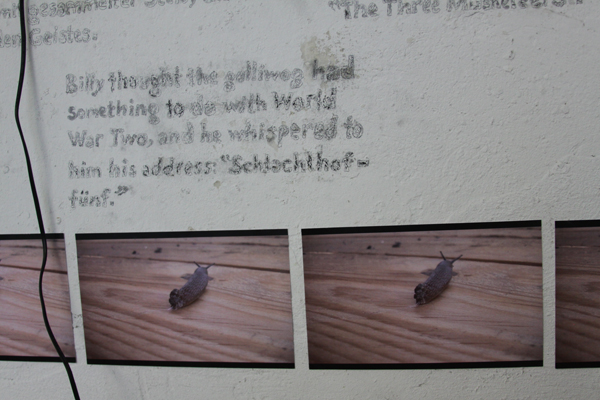
Detail from the installation “Cosmic Echolalia“, 2014
Citizen Cosmos Om Competition
20/07/2014
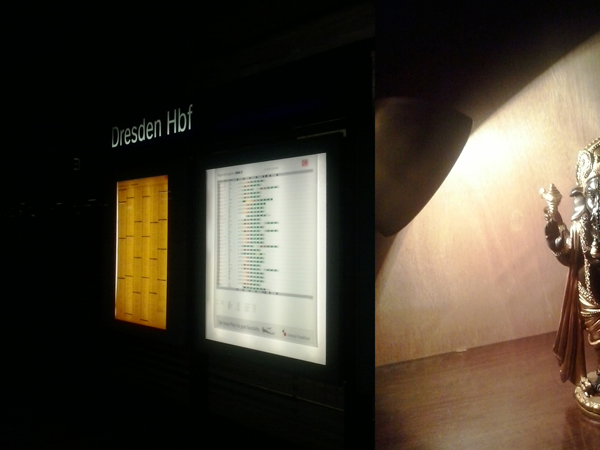
This is a game that anybody who is waiting for their trains at the main station can join. It will take max. 5 minutes. It is called the “Om Competition”, played between two opponents. First competitor will breathe deeply through the nose and start saying the “Om” mantra until he/she is out of breath – and I will measure the time. Then the other one will start to say “Om” – and I will measure the time. The one who has uttered the longest lasting “Om” will be the winner, taking the title “Citizen Cosmos”. Having the “Citizen Cosmos” title provides its owner many benefits regarding travel issues.
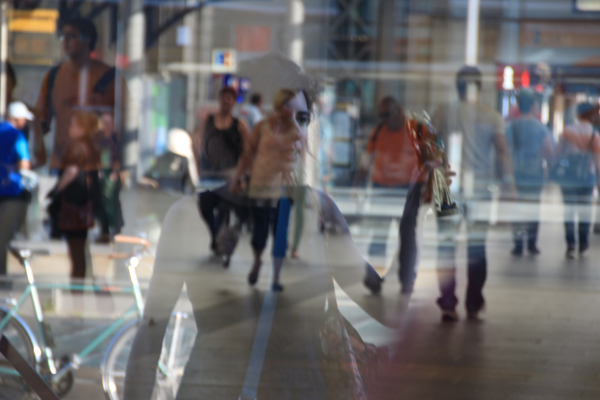
Citizen Cosmos can travel around the world, around the universe, the space, galaxies and so on.
Citizen Cosmos is free of visa.
Citizen Cosmos is welcome everywhere – but only for the duration of one “Om”.
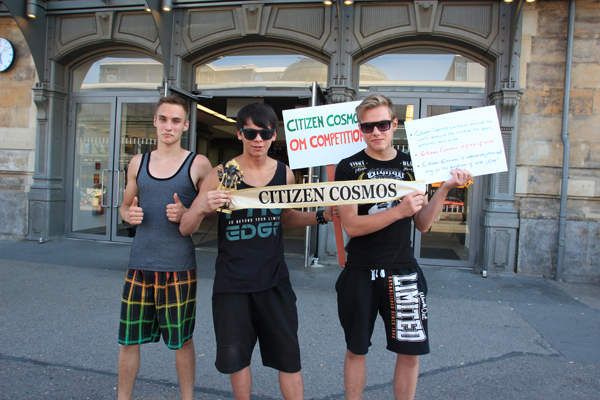
“Om” is said to be the primordial sound that was present at the creation of the universe. It is said to be the original sound that contains all other sounds, all words, all languages and all mantras.
“Om” is more than a sound, but the vibration of the universe. It is the frequency of energy that connects and joins all things together.
“Om” is the sound of the universe – it represents the past, present and future.
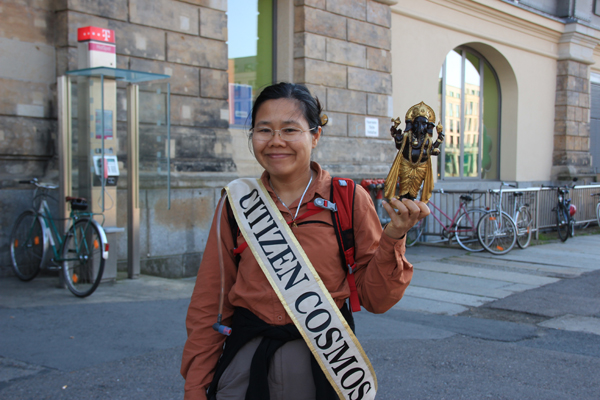
Lord Ganesha represents Pranava, the seed syllable OM, which means “Cosmic Sound.”
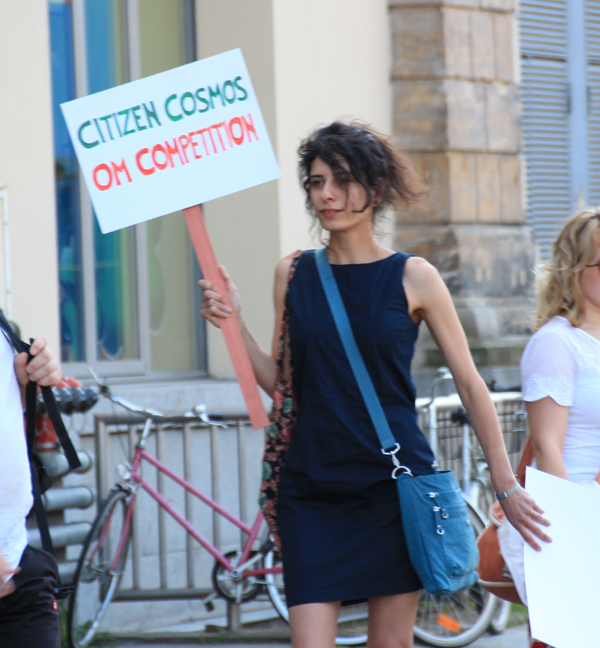
I, as the organizer of the Om Competition, announce the winner. I do it in the present.
I declare the promises of the winner’s title “Citizen Cosmos”, which is about the future as being a promise.
In the end, I declare that the period of the validity of the “Citizen Cosmos” title is limited with the duration of one “Om”, which has already been uttered by the winner in the recent past.
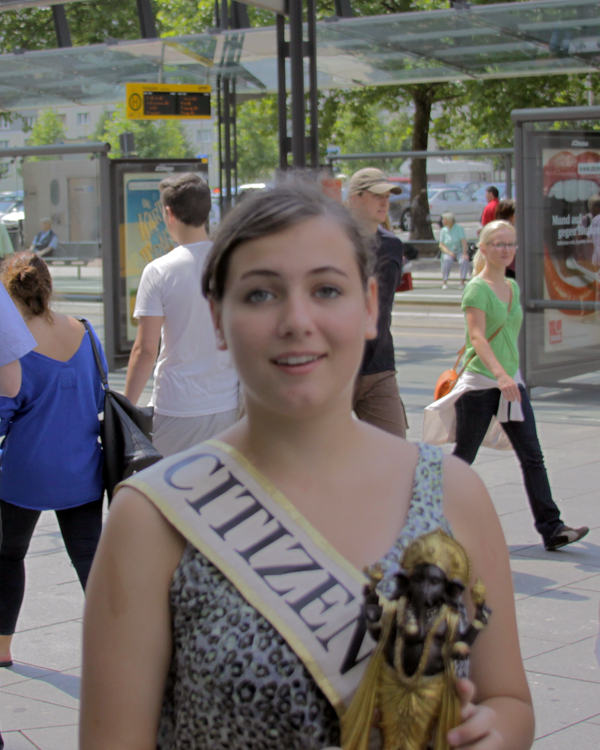
In the end, beyond the representation, Om Competition itself is the past, present and future at the same time.
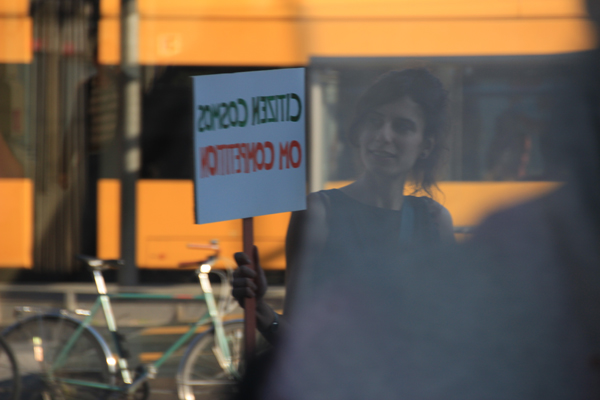
This game is an attempt to be a part of the universe but only within its limitations. Keeping the possibility of a zone beyond the representation is the core of this attempt. Since the start of the civilization, measuring the unmeasurable has been our routine and we all are part of the universe as long as we are aware of this routine. How to do with this awareness is up to the person – but anyway, the universe won’t take it personally for sure.
May the cosmic sound be with you!
OSTRALE’014
18/06/2014
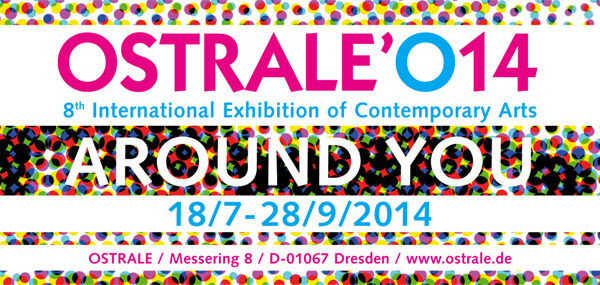
The OSTRALE as the third-biggest annual exhibition of contemporary art in Germany presents all genres of the international contemporary fine arts.
Its eighth edition will take place from July 18, 2014 until September 28, 2014 – true to the motto “Around You”.
The OSTRALE focuses on artistic positions and perspectives which bring up questions – here and elsewhere – which affect the spectator, which puzzle, and connect. In recognising different identities and modes of expression, as well as recognising their equal participation in the discourse within contemporary commitment, we see an important potential for an open-minded Europe.
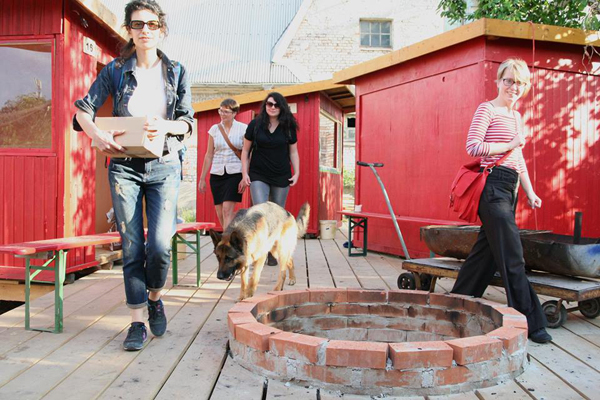
Arrival of the first artists in Artcamp! In line with the program “Artist in Residence”, for four weeks some of this year’s OSTRALE artists have the opportunity to stay on site, to chat and to create works of art. Today we welcome Şafak Çatalbaş (left, TR), who is making her contribution to the project “Private Nationalism”.
Save the Date: Opening of OSTRALE `014 on July 18, 2014.
Private Nationalism / Pécs, Hungary
13/05/2014
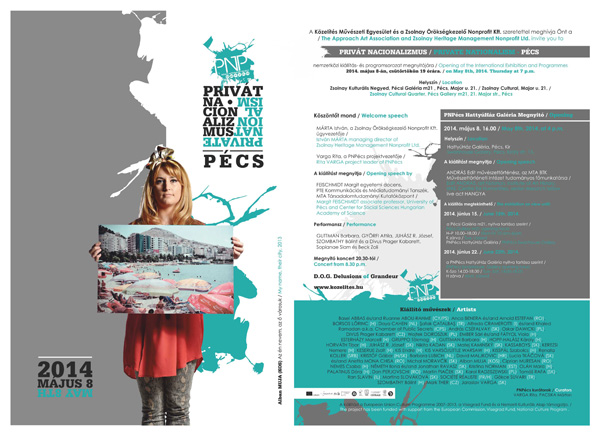
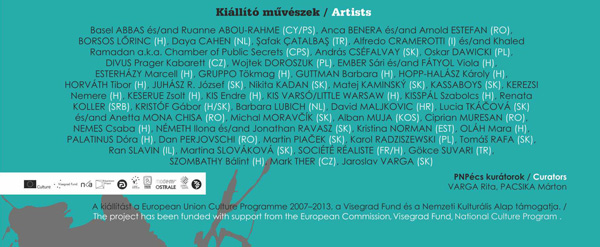
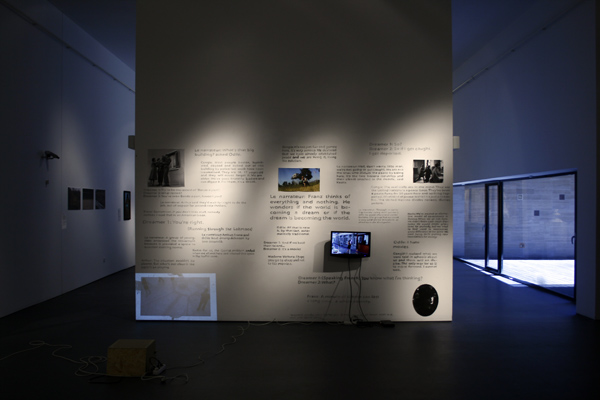
L’espace, 2013 / View from the Private Nationalism exhibition in Pécs, May 2014
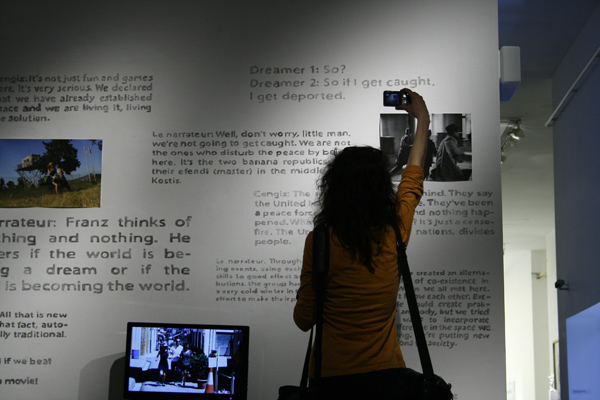
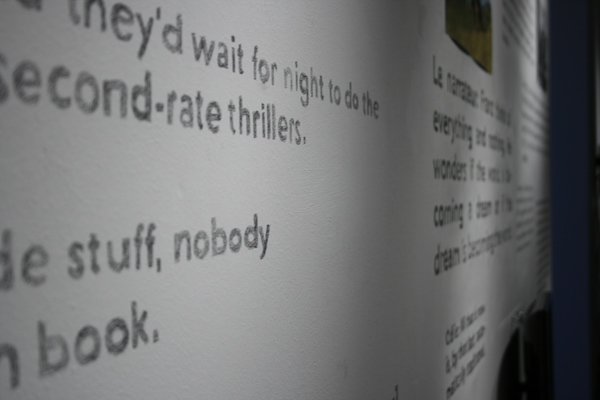
Details from the installation “L’espace”
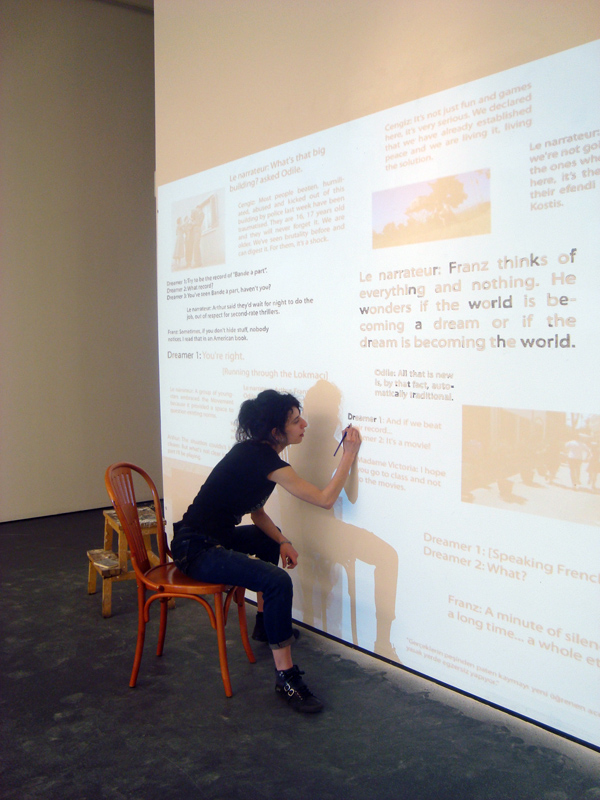
L’espace / working process
BorderBody – Mixing Futures
17/04/2014
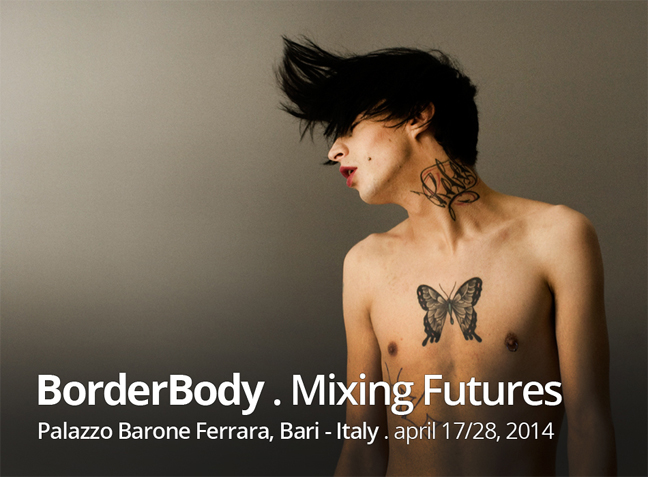
BorderBody – Mixing Futures International video-art, photography and performing art festival
Opening: April 17, 2014
BorderBody – Mixing Futures, international art festival of photography, video art and performing art will be held in the prestigious Palazzo Barone Ferrara in Bari (Italy), from the 17 to the 28 (extended) of April 2014.
BorderBody exhibitions cycle is conceived as a diffused and nomadic festival in different places of the world. Mixing Futures, the final chapter of this 3-event cycle, explores the future visions of our society, subjected to a process of continuous evolution and cultural hybridization. People, backgrounds, societies, progress and all their inputs creates hybrid identities, modifying each other and being mixed in prospect to shape a better world. Mixing sustainable transport, modern (ICT) communication infrastructure, sustainable economic development, and wise management of natural resources, human, intellectual and social capital, is the key to reach a future better life quality.
More than 30 artists from all-over the world have been selected to take part in the exhibition. A special section of the festival will be dedicated to the Argentinean Contemporary Art, with a selection of video artists curated by the gallerist Laura Haber. Among the invited artists, it will be possible to admire the photographic works of Marko Stamatovic, Serbian artist founder of “FOTORAMA International art photography festival”, one of the most important photo festival of East-Europe. During the opening night there will be the live performance of the American sound artist NK Riot (Los Angeles).
organizer: International ArtExpo curator: Luca Curci press office: It’s LIQUID exhibition & screening places: Palazzo Barone Ferrara, Corso Vittorio Emanuele II n.102/A, Bari (Italy) dates: from the 17 to the 28 of April 2014, from 10.00 AM to 01.00 PM and from 03.00 PM to 06.00 PM opening: April 17, 2014 at 06.00 PM, at Palazzo Barone Ferrara
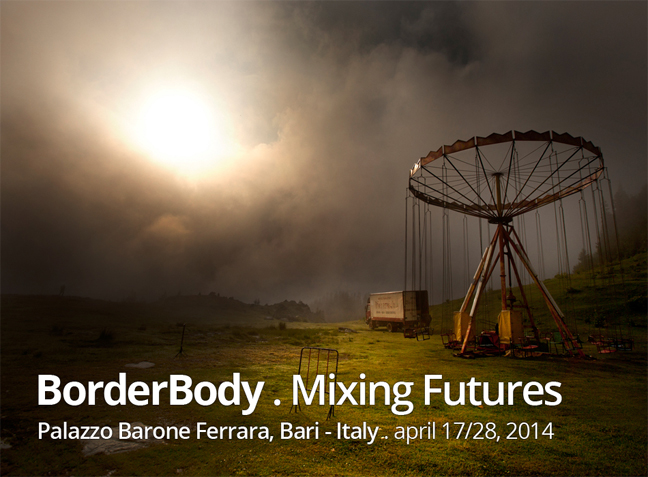
.featured artists
Marko Stamatovic . Serbia | Sandra Franco . UK | Serap Sabah . Turkey
.video art
Bill Psarras . UK | Donato Arcella . Italy | Mar Garrido . Spain | Mustafa Kula . Turkey | Elda Torres & Patrizio Pampaloni . Italy | Juan Carlos Muñoz-Najar . USA | Michael Nelson . USA | Despina Ikonomopulu . Spain | Juliana Bom-tempo . France | Yusuf Özal Çelik . Turkey | Roberta Cianciola . Italy | Jesus Segura . Spain | Şafak Çatalbaş . Turkey | Lino Ricciardulli . Argentina | Monica Miller . Argentina | Mariana Copello, Atilio Schweizer & Guillermo Soto . Argentina | Nicolás Martella . Argentina
.photography
Rafa Zart . Brazil | Bertram Marstaller . Germany | Maquiamelo . Colombia | Annalisa Lucenti . Italy | Paula Boarta . Romania | TGFN – The Girl From Nowhere . USA | Xavier Blondeau . France | Veronique Lerebours . USA | Heba Serag Eldin . Egypt | Sara Roitman . Ecuador | Brigida Zarcos . Portugal | Sydney Lowe . USA
.performing art
NK Riot . USA (on April 17 2014, at 08.00 PM)
Mamut Art Project 2014
09/04/2014
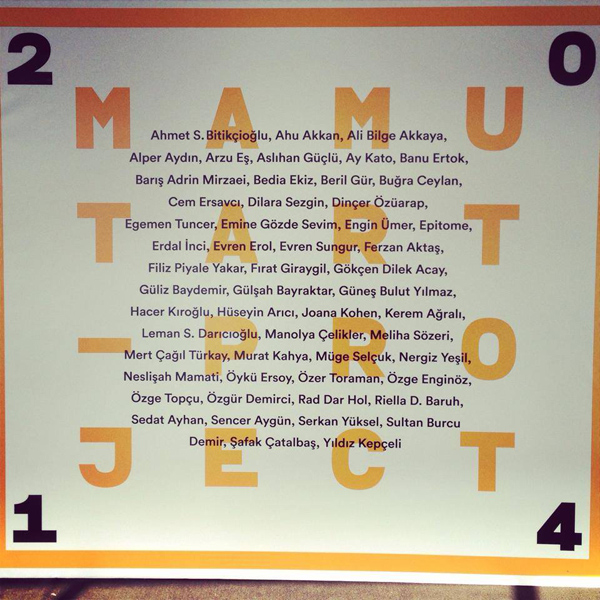
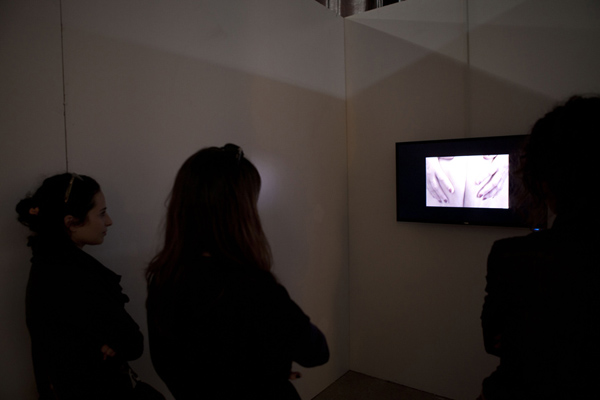
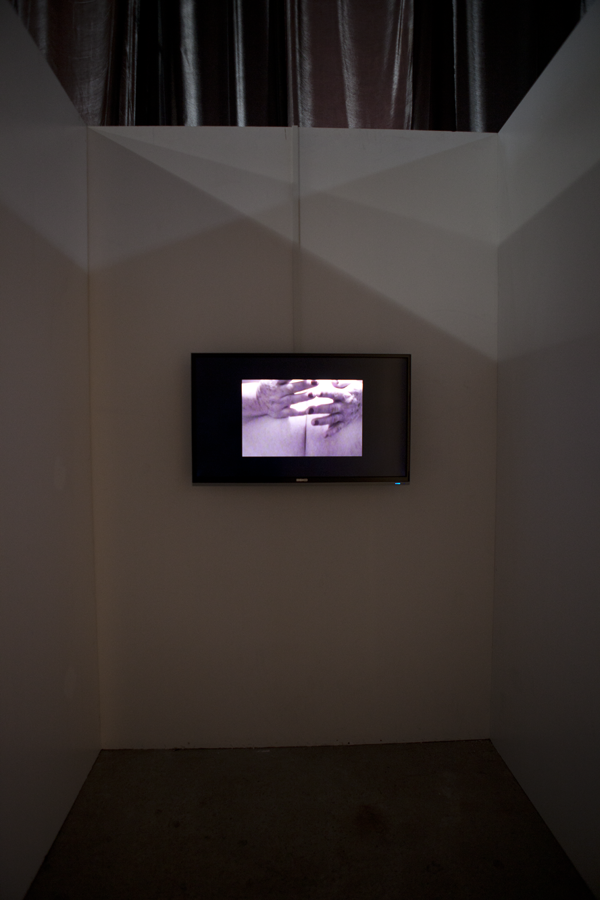
Corset, 2010
View from the exhibition “Mamut Art Project” – KüçükÇiftlik Park, İstanbul, 3-6 April 2014
Law of Delusion / Performative Lecture
26/02/2014
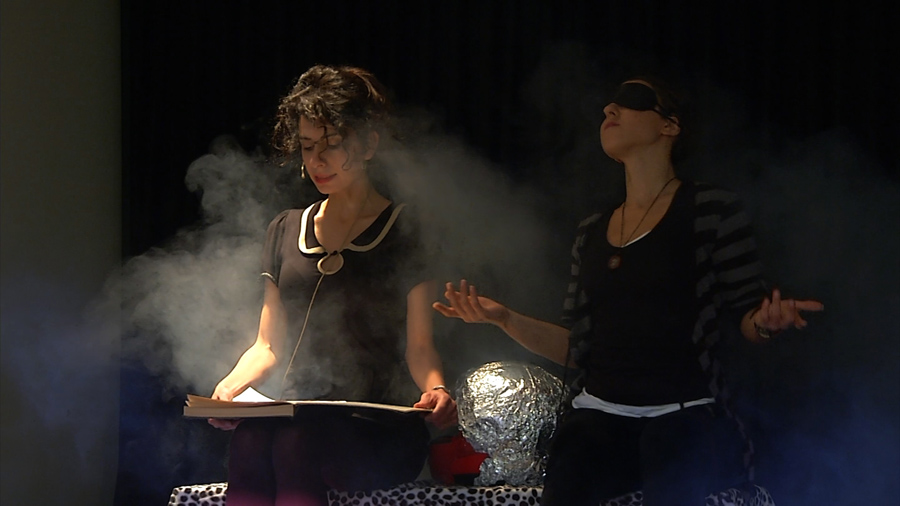 Hukuk-u Hayal (Law of Delusion), performative lecture; Co-action Device: A Study, 13th Istanbul Biennial, Galata Greek School, 2013
Hukuk-u Hayal (Law of Delusion), performative lecture; Co-action Device: A Study, 13th Istanbul Biennial, Galata Greek School, 2013
The narrator performs the following text reading it on stage. The translator who steps in upon hearing the first Latin words (“Leges Duodecim Tabularum”) accompanies the text by improvising in a language he has made up that sounds like Latin; translates the text into this concocted language. The presence of the translator and his spontaneous contribution turns into a performance on its own as an absurd layer added to the prewritten presentation text.
________________________________________________________
Religious law, civil law, law of delusion
Article 62, paragraph 5, clause 1
Article in the Systematics of Law
When the entire city is fast asleep,
Fatties desk-bound,
Slackers in the moonlight,
Inspecting married mice
At a reputable shelter,
As accords the laws of engagement,
Holding unsanctioned meetings
With null and void boards
Where did these articles come from, when the nature of matter and memory are so different?
Once upon a time, as they were put into writing, laws started to undergo a change. Laws which were rhymed, simple and poetic in oral tradition primarily so that they would be easier to memorize became complicated once put into writing. Sentences grew longer and became passive. Scores of sub-clauses were added into single sentences. Texts gradually became more abstract. As details multiplied a broader, more inclusive language was adopted. For instance the acts of killing a person with a knife, pistol or by strangulation or overdose are all covered in a single article: Murder.
Aggravated Homicide
Article 82.- (1) In cases where murder with intent is perpetrated;
a) By plan,
b) Savagely or through infliction of torment,
c) With fire, flood, destruction, sinking or bombing or by use of nuclear, biological or chemical weapons,
d) Against any one of the antecedents or descendants, or spouse or siblings,
e) Against a child or a person who cannot protect himself due to corporal or spiritual disability,
f) Against a pregnant woman,
g) By virtue of public office,
h) With the intention of concealing or facilitating commission of an offense, or destroying the evidences,
i) (ADD: 29/6/2005 – 5377/9 art.) With the rage of not having committed a crime,
j) Blood feud,
k) By motivation of custom,
the offender is sentenced to heavy life imprisonment.
Rules of law were put in writing upon the people’s demand for transparency. The first written legislation of the Roman Republic era namely The Law of the Twelve Tables (“Leges Duodecim Tabularum”, 451- 449 BC) was prepared as a result of the Roman people’s (plebian) demand for access to law.
- Sumumi u sumumi del manta. Sumum cus sum mai danka. Sum pukika. Saylent les intoraryum sivis pakem pare moskito. Summitu sun carianta – sie sie paradita.
Until then the Roman people were governed by the nobility (patricians) according to the rules of customs and traditions which were kept like a secret. In order to learn these rules people used to consult individuals deemed knowledgeable by the society who would make explanations if they felt like it. Moreover these individuals did not hold any authority or responsibility regarding the explanations they made. Finally in order to bring an end to the arbitrary practices the public demanded the unwritten flexible rules of customs and traditions to be transformed into a written system accessible to everyone.
- Sapia dominus arthur. Dominus may go nutus.
However, in a manner contrary to this demand for transparency, the language of law put in writing started to become complicated over time and lose its transparency.
- Sapia meskotanta. Kaos strade.
But why – why?
- So homi insekale?
- Who knows?… To boast, to establish power, to monopolize classified information, to make people dependent on one’s self, etc…
- Radiks malaryum eskapilas. Eskapitas malaryum la barbare…
- Well, to me these sound like human weaknesses.
- Kue kapito non se te tio.
- Wonder if laws are human?
- Kuepta latina ditto homina huminis big appetitetus?
- It is yet unknown but is being researched. Rumor has it that they’ve been seen sparkling and moving in the sky on certain nights.
- Kuyido huyimon petta, astra.
- I would not know, no need, don’t want to be put down as a witness.
- Kuali zartifos, ta reo, no ma pare!
… Then in the presence of witnesses I declare these two people man and wife.
- Nimu varitti prodram, la va bandi, la me huerte.
You may kiss the bride.
- Kue sarte, puero.
So you see; when the need arose to kiss the bride there emerged a demand for a right.
- Neo bisita neo bici tamba onli bit quaste.
This claim was regulated by laws and a family was started.
- Luptes piribus, quare, home. Home totalli.
Is that what happened? Let’s see…
- Homo… Homo quik…
The anatomy of a relationship:
Needs – rights – laws
- Homo su human naniante aliante punto – punto della tempra
Needs – laws – rights
- Lestudo el humus loreyne il vertel macistreto
Rights – needs – laws
- Luptus tribus la viba obvimus
Rights – laws – needs
- Hora figistlet homi humuni lupus
Laws – needs – rights
- Lupus hummuni mumo
Laws – rights – needs
- Humusi humadi mila aliyenti punto
The combination
- Luptu minibus lirayi tribus e lustiya omnibus homo homini lupus
While human needs are in individual persons (and generally the needs are in all sorts of living beings),
- Homo water porti min il ravioli,
human rights are between these individuals.
- Luptis viribus humuni trubus.
Between us
there are
rows of rights
sometimes separating us
or bringing us closer
or even gluing us together
every second
Plunder!
Anglo-Saxon law is based on cases, the judge looks at earlier decrees given in similar cases. Let’s take a look at that famous case of “Loving Law”: Mildred Loving, black woman; Richard Loving, white man. Year 1967. Place Virginia. The law of love was rewritten. America is on fire. At least two people. There must be at least two people to make a demand for a right. When the common needs warming up in hearts are cooked with the demand for a right, they are served before the law. At the end of a long struggle the law that prohibits interracial marriage is annulled by the American supreme court.
- Dura lez lets sex, do senta distur, do sente dustur skribente cogito. Desiperi um cestrum gestribum. İl gestriuim de juri, de facto. De facto, occupy.
When word and action come together, when my word becomes the law, a hayloft becomes a dream castle. I say therefore I do. I salute Austin and pronounce you all man and wife.
- Se sentre le regime iniyotis butcher ipse ipse les repetita klasse irresete nor no narbeila, kesanta torto le ges masita barbarian.
What does norm mean?
- Bi subeta presa norm?
What is normal?
- Bis repetite klase bis repeta “la normal”?
Are norms static or dynamic?
- Simus ea static, simus ea dinamic?
If norms change constantly, can normal remain constant?
- Siges lege interalma interalma le siges paçen provakemistiker?
Norms can change.
- Simo suis, in inkrebende.
There are normative acts.
- Simus e sim kuade normale.
These don’t have to be the norm.
- Sim sirius sima injuria – sim puika.
They are not defined as normal and abnormal.
- Sivis paçen parabinnup.
An example:
- Sis pacye:
The sign that was used for the bicycle lane in Philadelphia used to be like this (Figure 1A) whereas in the new figure the cyclist is wearing a helmet (Figure 1B). This addition is a normative act: It proposes cyclists should wear helmets. Wearing a helmet may or may not become the norm, and it absolutely cannot be qualified as normal or abnormal. However, in any case by encouraging wearing a helmet a normative act is undertaken.
- Diem perdide dies erdid i diyes semper irade, vittirius e quas, vi quas a dixi, disketti disco. Scrabenti cogito. Cogito, cogito el bossum.
A normative act is undertaken.
- Doktus kon libro, domestus vi.
An act is undertaken.
- Doktus vubius, doktum libro, ilberati libre librimo.
Act is undertaken.
- Dİes libro deguel la si sental.
Under-ta-ken.
- Vittirius.
- Why are you speaking in the passive voice?
- İve koras kua temporaryos?
- Because the laws speak like this.
- Where is the subject?
- Biks, co sinto?
- The subject is in effect, it will come.
- Do sento kon libru.
The norm receivers are the states and the norm sender is the community or organization of states, today generally interpreted as the United Nations General Assembly convening for universal human rights; and the norm objects are individuals. (J. Galtung)
- Draku komnients, nante tragablus, trablus do cento libido domini.
… An animal, a tree, a celestial object or structure may be the cause of evil, but it can’t be a norm sender and/or norm receiver. Or we assume so as per the rules of modernity.
- Erare humani eprense e perseviye dia de kul. El die di kul, kuetempre filaro del tempre o das humanas mendas.
(here an animal, tree, objects can be used)
- El frutto, el hu, cogne satur, emim tablus, cigarre, mondi…
Who is this LEGAL ENTITY?
- Ecco hommo?
If not in reality, at least in theory a legal entity is active agent who can receive the relevant norms in two ways.
- Ex abstrato, abstratos quan videli.
CHORUS:
*Fâilâtün / Fâilün /
Mefâilün / Feûlün!
Legal Entity 1:
- İli tebum prince:
- Please let us not take it personally…
- İl fakito ilemi piers…
Legal Entity 2:
- il dento ibse i dente:
- Hah, you are not the one I answer to.
- İe gus tedelse que, ade!
- A. Legal entity
- Bikura opus.
- A-aaa! Legal entity
- Bikorun quartos.
Article 50. -
- Fraktatum les melli.
The will of the legal entity is expressed through its organs.
- Ortis et lieber, diagonal, de spleen.
The organs may put the legal entity under obligation by legal transactions and all other acts.
- Homosu humano mimenti alimenta puku, puku bonus tadıki, la visa.
The organs of legal entity are also individually responsible from their defaults.
- İbide minez, enis hominu, iris noche.
… and the legal entity who gets diarrhea leaves the room in a hurry.
- İn medio stap brütüs, ol partibus, partibu slibus, konsettu solicis, tibi tibi turbo.
10 breaths, intermittent.
- İn vino, vitru viva, intro viva, de isto, de isto, de histo.
The perpetrator centered approach appears in many places in this legal paradigm.
- İros so soleil froid de best, ire et dona best.
First, the fundamental unit is the perpetrator. (J. Galtung)
- Aytego artini, dela batto.
Second, the legal perspective tries to use three methods under the heading of “dealing with wrongdoing”
- Luvari in verbe magistruano, verteko, vertemuti:
1. Reforming the perpetrators
- İriverte traleybus
2. Enfeebling the perpetrators
- Jivestati kamso veylo, macente
3. Pacifying the perpetrators
- Maglevenu genelo simto itur, astragata ittur
CHORUS:
Punishment!
Punishment!
Heaven and Hell
Reward and Punishment
Concrete perpetrators
- Maraganu, obvious praise, malamanus, obvious ridicule
The legal system defends itself in face of situations not pertaining to norms.
- Makte o amito cenerasum quer sikritum. Sikritum non linere rebetika.
The legal system re-finds itself with the volition of law.
- Magreti sente karbus, magreta katrium nesesitas.
E. Dissolution of personality
- Vidi quare kibirut
F. Reserved provisions
- Kuegna natura saba
The rest of the story is reserved under various provisions.
- Memento ori resemble, memento mori.
Limited continuation has been regulated with additional articles and is optional with the purpose of liquidation.
- Mendeso menere otopre, mendeso more autoportrait.
Epilogue
- Milita tombris
“The like attracts the like”,
-”Misif dominici.”,
is a fundamental law accepted by individuals who have been subject to the mirror effect.
- modis viviendi il morsel vitta interno.
There is a fundamental similarity between traditions of the law and thought patterns of cultures.
- Multisi mukatti eleveretta simta vivendi operendi du domineci.
- In Anglo-Saxon / Scandinavian normative culture incompatible norms may be discarded.
- Avudo sempre anglosaxon el kubris el monere, et trettapra.
New norms replace these.
- E… El kompenia sere to se, toto retti.
In German normative culture incompatible norms may be concealed.
- Nihiles omnenpartu, sweep underatu.
The “pyramid of norms” from the past is not rejected. New norms may be added.
- Novi smisero premium non chiente, non chiente obstrata.
In Latin normative culture incompatible incidents are addressed one by one.
- Non fi fi non su o kuro.
The normative system is more an object of admiration than alliance.
- Novi se sinsure novi kom tere mium no ce.
Norms are preserved.
- No sete estiembre evidente.
Grace of the word!
- Nun inte eda mimu, sedu edante.
In Japanese normative culture there is less emphasis on deductive rigidity, and more on reciprocity with the world of phenomena.
- Lise domnibes agri domino nom sobis non yamagashi, inoti tubula.
With a masterful reinterpretation, norms are interpreted. (J. Galtung)
- Ute tam bido sedu just a sprinkle.
… and without seeking complaint, the punishment to be decreed is increased by half.
- Num nan kuen es libentum el deus half en halfe.
Concrete perpetrators lived happily ever after,
- Okire pulus cushion quandu kulus,
and the null and void in condominiums …
- Occupy Gezi!
* Two patterns of Arud meter in Diwan poetry
Law of Delusion
Şafak Çatalbaş
Text: Şafak Çatalbaş, Pınar Bahtiyaroğlu
Performance: Şafak Çatalbaş, Ali Şahan Kuru, Sırma Öztaş (with Seçil Demircan, Nazlı Bulum, Rıdvan Erdem Kaynarca and “Co-action Device Chorus”)
Co-action Device, 2013
L’espace – Text on the wall – Narrative Quotes
01/11/2013
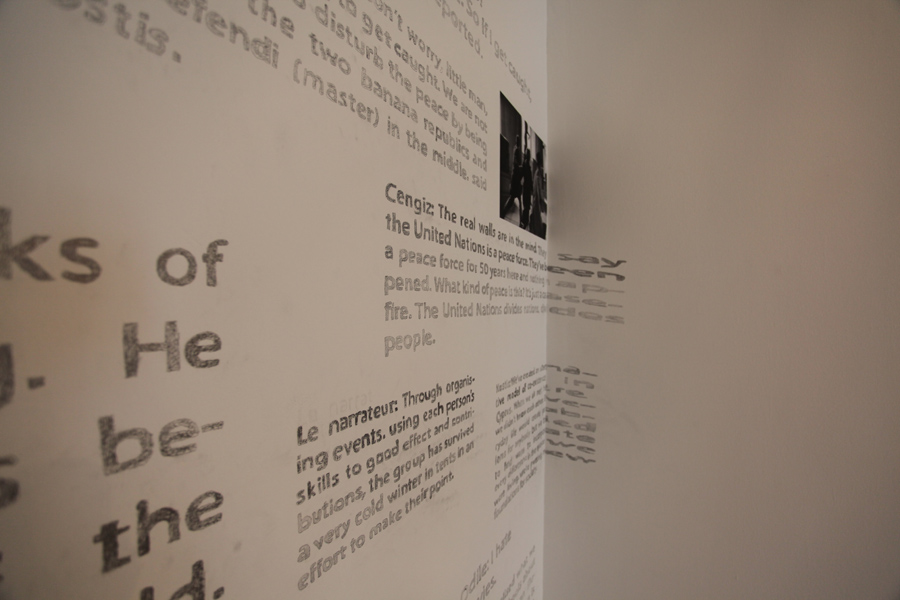
L’espace, 2013, installation, detail
“Bufferzone: Check Point” exhibition, Apartment Project, DEPO, İstanbul, 2013
Le narrateur: What’s that big building? asked Odile.
Cengiz: Most people beaten, humiliated, abused and kicked out of this building by police last week have been traumatised. They are 16, 17 years old and they will never forget it. We are older. We’ve seen brutality before and can digest it. For them, it’s a shock.
Dreamer 1: Try to be the record of “Bande à part”.
Dreamer 2: What record?
Dreamer 3: You’ve seen Bande à part, haven’t you?
Le narrateur: Arthur said they’d wait for night to do the job, out of respect for second-rate thrillers.
Franz: Sometimes, if you don’t hide stuff, nobody notices. I read that in an American book.
Dreamer 1: You’re right.
[Running through the Lokmacı]
Le narrateur: Arthur, Franz and Odile beat Jimmy Johnson by two seconds.
Le narrateur: A group of youngsters embraced the Movement because it provided a space to question existing norms.
Kostis: For us, the Cyprus problem ended when we all met here and created this space in the buffer zone.
Arthur: The situation couldn’t be clearer. But what’s not clear is the part I’ll be playing.
Cengiz: It’s not just fun and games here, it’s very serious. We declared that we have already established peace and we are living it, living the solution.
Dreamer 1: So?
Dreamer 2: So if I get caught, I get deported.
Le narrateur: Well, don’t worry, little man, we’re not going to get caught. We are not the ones who disturb the peace by being here, it’s the two banana republics and their efendi (master) in the middle, said Kostis.
Cengiz: The real walls are in the mind. They say the United Nations is a peace force. They’ve been a peace force for 50 years here and nothing happened. What kind of peace is this? It’s just a ceasefire. The United Nations divides nations, divides people.
Le narrateur: Franz thinks of everything and nothing. He wonders if the world is becoming a dream or if the dream is becoming the world.
Le narrateur: Through organising events, using each person’s skills to good effect and contributions, the group has survived a very cold winter in tents in an effort to make their point.
Kostis: We’ve created an alternative model of co-existence in Cyprus. When we all met here, we didn’t know each other. Everyday life would create problems for anybody, but we tried to find ways to incorporate every difference in the space we were living. We’re putting new foundations for society.
Odile: All that is new is, by that fact, automatically traditional.
Dreamer 1: And if we beat their record…
Dreamer 2: It’s a movie!
Madame Victoria: I hope you go to class and not to the movies.
Odile: I hate movies.
Cengiz: I realised what we were told in schools about us and them was an illusion. The only way for us is to move forward. I cannot wait.
Dreamer 1: [Speaking French] You know what I’m thinking?
Dreamer 2: What?
Franz: A minute of silence can last a long time… a whole eternity.
Bufferzone: Check Point
31/10/2013
Bufferzone: Checkpoint
Opening: October 5th, 2013, Saturday 18:30
DEPO/ Tütün Deposu Lüleci Hendek Caddesi No.12
Tophane 34425, İstanbul
Exhibition Dates: October 5th-November 10th 2013
Visiting hours: Tuesday-Sunday, 11:00-19:00
Apartment Project will be hosted by DEPO between October 5th and November 10th with their concluding works from the Bufferzone workshop, exhibited under the title “Checkpoint”
The exhibition, as a part of the collaboration of the Apartment Project, the EMAA (Mediterranean European Art Association – Nicosia) and Uqbar (Berlin), consists of works by; Hasan Aksaygın, Özgür Demirci, Didem Erk, Gabriele Garavaglia, Anna Heidenhain & Frederic Lezmi, Naomi Hennig, Eleni Mouzourou, Birgit Auf der Lauer & Caspar Pauli, Erhan Öze, pick nick projects, Sümer Sayın, and with special invitations from participating artists of the “Bufferzone” workshop; Sabine Küper-Büsch &Thomas Büsch, Şafak Çatalbaş and Hüseyin Yılmaz.
Bufferzone workshop, being the first of a series of workshops that focuses on divided cities and buffer zones, took place in Istanbul and Nicosia in March and April. The project aims at taking a closer look at divided cities, buffer zones, and ancient city walls, contrasting; fenced sovereign nation, gated communities // demographic cultural and social class segregations, and how we define those who reside beyond borders, “the other”.
The first workshop “bufferzone” has been shaped with the notion of digging deeper into conceptual layers of dividedness and borders as well as initiating a study with mobile experience, involving an exploration with communal living and working dynamics.
The workshop participants together have developed diverse approaches to the concepts of polarization, gentrification and various manifestations of ‘border’ within the urban landscape. These approaches depict a wide panorama, from ‘the borders as a control mechanism’ to ‘the state of mind of mutual surveillance’; while drawing through the visible/in-visible walls between neighborhoods inflicted by urban transformations, revealing the micro economies and ecologies within the landscape. Checkpoint is a body of work developed solely by the artists’ diverse approaches, collective and individual practices, presented by Apartment Project, at DEPO until 10th of November.
The Bufferzone project is supported by the Anna Lindh Foundation.
www.apartmentproject.org
www.buffer-zone.org
